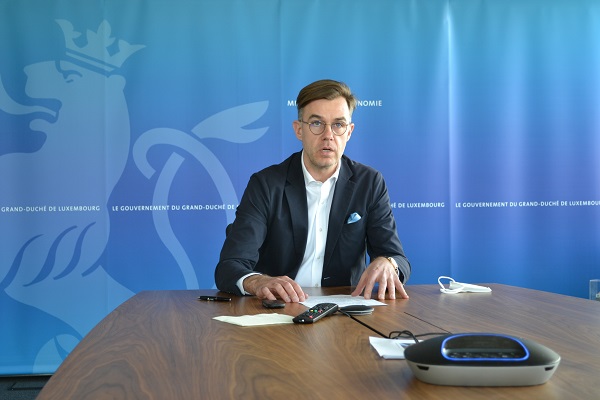 Franz Fayot, Luxembourg's Minister of the Economy;
Credit: MECO
Franz Fayot, Luxembourg's Minister of the Economy;
Credit: MECO
On Thursday 25 February 2021, Luxembourg's Minister of the Economy, Franz Fayot, participated via video conference in the Competitiveness Council (COMPET) of the Council of the European Union (EU).
During this council meeting, European Ministers of the Economy focussed in particular on the national COVID-19 recovery plans, transparency of company accounts and consumer protection.
They debated the proposal for a directive on the public country-by-country reporting (CBCR) which aims to oblige companies to make public certain accounting data such as their turnover, profit and taxes paid. During his speech, Minister Franz Fayot recalled that Luxembourg supports and applies all European and international rules on tax transparency and that the Grand Duchy is also engaged constructively in order to advance the EU's agenda in this domain.
The Economy Minister also stressed that Luxembourg does not oppose the underlying principles of the proposal for a public CBCR aimed at increasing transparency in tax matters, although it disagrees with the legal basis that was chosen to advance and discuss this proposal. Minister Franz Fayot recalled that Luxembourg's position according to which the question of the appropriate legal basis for discussing and adopting tax provisions in the EU is a question of principle which is not negotiable. He added that, for the Grand Duchy, it is worrying to note that tax issues are discussed and adopted outside the area reserved by the European Treaties for taxation.
Moreover, the Luxembourg government deemed it regrettable that the opinion of the Legal Service of the Council, which Luxembourg fully supported, had been ignored on this subject. Minister Franz Fayot explained: “Luxembourg remains of the opinion that the file relating to 'public country by country reporting' falls within the domain of taxation and that it must therefore be dealt with in the ECOFIN channel. However, given its commitment to tax transparency, Luxembourg will not stand in the way of the Council Presidency's objectives with regard to the proposal for a directive on the publication of country-by-country information".
Within the Competitiveness Council, the ministers also discussed the national recovery plans within the framework of the European Recovery and Resilience Facility (RRF) in order to achieve the objectives of the EU's green and digital transition. During his speech, Minister Franz Fayot pleaded for an ambitious recovery plan that supports cross-border projects that benefit all EU members. He insisted in particular on the importance of the internal market, an essential asset for recovery. Thus, the free movement of goods, services and people must be preserved in order to maintain supply chains and thus guarantee European citizens the offer of essential products and services, including healthcare.
Luxembourg's Minister of the Economy stated: “If we want a Europe less dependent on third countries and create integrated ecosystems, we need more, not less cross-border cooperation. It is unacceptable to sacrifice the single market in the face of a crisis - and we must not give the impression that there is a choice to be made between health and the single market, because that is not the case”. He thus called on his European colleagues to show solidarity by defending the single market, which he deemed essential for resilience, autonomy and recovery. He concluded: “Ultimately, it is also a question of consistency and credibility".
Finally, the ministers held an exchange of views on the New Consumer Agenda which outlines the major priority actions in the field of consumer policy for the period 2021-25. This initiative is considered part of the lessons to be learned from the COVID-19 crisis, particularly with regard to respect for passenger rights and support for consumers throughout the dual green and digital transition.
In this context, the European Commission will be proposing a series of new legislative initiatives in the coming months. On behalf of the Luxembourg government, Minister Franz Fayot noted: "We support the Commission's desire to promote more sustainable consumption through legislative initiatives aimed, among other things, at strengthening the right to compensation, regulating 'Green Claims' or even tackling the problem of planned obsolescence. . It is also necessary to update the legal framework relating to general product safety, in particular to take better account of the development of the platform economy”. He also insisted on a clear articulation between the different legislations.








